Library
All resources
2101 – 2120 of 2425 results
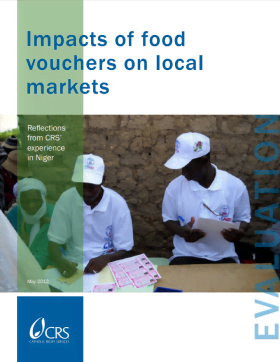
Impacts of Food Vouchers on Local Markets: Reflections from CRS’ experience in Niger
Report
In mid 2010, CRS-Niger designed and carried out a food voucher program to assist the most needy one-third of households in the departments of Ouallam and Tillabéri due to the poor harvest in 2009 (CRS, 2010). The ADVANCE project was implemented in collaboration with a local NGO partner Association pour...

Humanitarian Exchange: Special feature. New learning in cash transfer programming
Report
The special feature of this issue of Humanitarian Exchange, co-edited with Sarah Bailey and Breanna Ridsdel, focuses on new learning in cash transfer programming. While cash is now an accepted tool, and is increasingly being used in humanitarian response, most programmes are small and gaps in analysis and...

Review of emergency cash coordination mechanisms in the Horn of Africa: Kenya and Somalia
Report
In response to the drought and famine in the Horn of Africa in 2011, cash transfer programming (CTP) has been used extensively as a modality to meet humanitarian needs. Partly because the conditions permitted it (functioning markets, cash economies and delivery mechanisms), and partly because delivering...
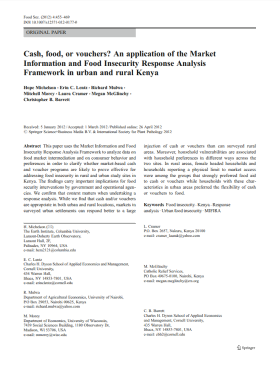
Cash, Food or Vouchers? An application of the market information and food insecurity response analysis framework in urban and rural Kenya
Policy paper
This paper uses the Market Information and Food Insecurity Response Analysis Framework to analyze data on food market intermediation and on consumer behavior and preferences in order to clarify whether market-based cash and voucher programs are likely to prove effective for addressing food insecurity...

Cash Emergency Preparedness (CEP) Pilots
Guidelines and Tools
CEP guidelines and key findings from pilot assessments.

Multi-Cluster/Sector Initial Rapid Assessment (MIRA)
Report
The immediate aftermath of a sudden-onset disaster is a critical period of time when the humanitarian and donor communities need to make key decisions on how to best support the affected country or region and its populations. However, during that brief period, limited comprehensive information on the...
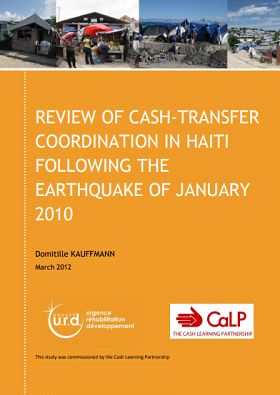
Review of Cash-transfer Coordination in Haiti following the Earthquake of January 2010
Case Study
This study, commissioned by the CALP Network, aims to review and document the coordination of cash transfer programmes (CTP) implemented from the emergency phase in Haiti. It is part of a wider review of CTP coordination in emergency situations which includes three case studies (Pakistan, Haiti and the...
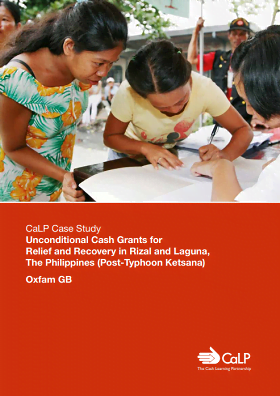
Unconditional Cash Grants for Relief and Recovery in Rizal and Laguna, The Philippines (Post-Typhoon Ketsana)
Report
In response to rapid onset flooding in Laguna and Rizal provinces in the Philippines, Oxfam International implemented a Cash Transfer Programme (CTP) in three phases: 1) Unconditional cash transfers for individuals to provide for basic needs; 2) Conditional cash transfers for individuals resuming income...

ICT/mobile Phone Technology: A shift in the right direction
Blog Post
Thirteen African nations came together for the AgriKnowledge Share Fair in Addis Ababa at the end of October 2012 to learn about approaches for quicker and more efficient humanitarian response. Government representatives, researchers, UN agencies and NGOs gathered for a three day symposium on best...

Mobile Money Transfer: A study on effectiveness and efficacy!
Report
For this study both structured and semi-structured questioning method were used. Few KII (in depth interview) along with a pre-designed questionnaire were used for understanding the benefits and challenges of this new method on different stakeholders.
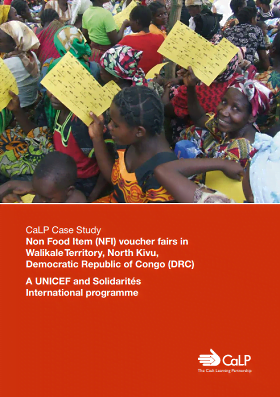
Non Food Item (NFI) Voucher Fairs in Walikale Territory, North Kivu, DRC (the CALP Network Case Study)
Case Study
In response to a rapid-onset emergency, UNICEF and Solidarités International utilized a cash-based voucher approach in Nyasi and Bobolo villages, in Walikale Territory, North Kivu, Democratic Republic of Congo (DRC). As part of a larger multi-province, multi-partner response programme in DRC known as...

The Impact of Cash Transfers on Nutrition in Emergency and Transitional Contexts – Synthesis paper
Report
Cash transfer programming is now widely accepted as a way to meet a variety of needs in humanitarian and transitional settings. Although the literature on cash transfers has grown exponentially over the last few years, as has their use in humanitarian interventions, the relationship between cash transfer...
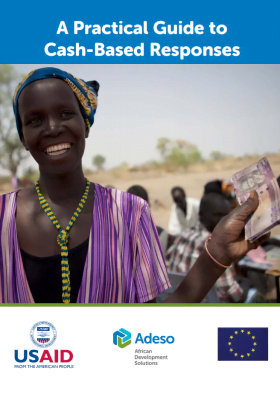
A Practical Guide to Cash-Based Response
Guidelines and Tools
A Practical Guide to Cash-based Responses is a manual developed by Adeso to share the organisation’s experience in developing and implementing appropriate cash-based responses. The manual highlights some practical problems that are faced by implementation teams around the world and it is intended to...
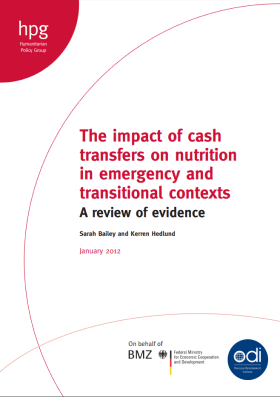
The Impact of Cash Transfers on Nutrition in Emergency and Transitional Contexts – Review of evidence
Report
This ODI / HPG commissioned report reviews the evidence of the impact of cash transfers on nutrition in emergency and transitional contexts. The research finds that evidence from humanitarian evaluations makes a strong case that cash transfers often improve dietary intake. There is less evidence that cash...
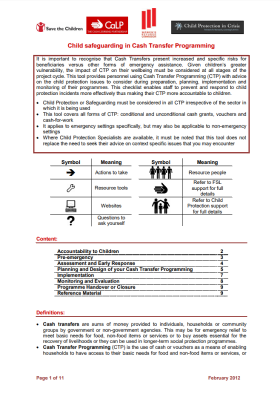
Child Safeguarding in Cash Transfer Programming Tool
Guidelines and Tools
It is important to recognise that Cash Transfers present increased and specific risks for beneficiaries versus other forms of emergency assistance. Given children’s greater vulnerability, the impact of CTP on their wellbeing must be considered at all stages of the project cycle. This tool provides...

Mobile Technology in Emergencies
Policy paper
Mobile phones are increasingly accessible to those affected by crisis and can play a strategic role in the delivery of rapid, cost-effective, scalable humanitarian assistance. However, the full potential of mobile phones to work as transformative tools in emergency response has not yet been realised. This...

What Cash Transfer Programming can do to Protect Children – Discussion Paper
Report
This discussion paper examines the links between cash transfers and the positive and negative outcomes for children, in particular the role cash transfers have played in protecting children from harm, exploitation, abuse and violence. The objective of this paper is to identify ways in which cash transfer...
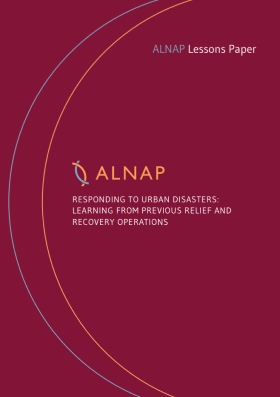
Responding to Urban Disasters: Learning from Previous Relief and Recovery Operations
Report
This paper outlines key lessons related to the design and implementation of urban disaster-response programmes. It focuses particularly on the response and early recovery phases of an urban emergency, and on natural disasters such as earthquakes and flooding. It is written for people planning and...
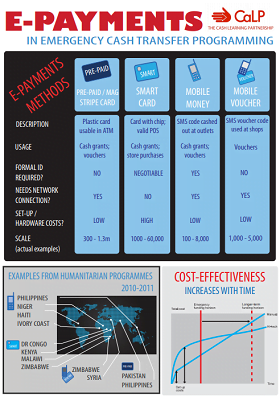
E-payments in Emergency Cash Transfer Programming
Guidelines and Tools
This 2-pager summarises some of the main features, benefits and challenges of 4 different electronic payment methods that can be used to deliver cash transfers in an emergency: pre-paid cards, smart cards, mobile money and mobile vouchers. It is drawn from the CALP Network research on New Technologies in...
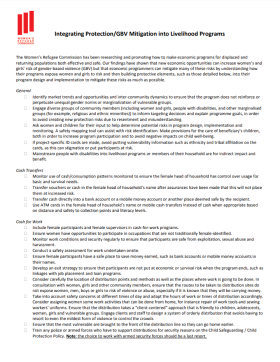
Integrating Protection/GBV Mitigation into Livelihoods Programmes
Guidelines and Tools
The Women’s Refugee Commission has been researching and promoting how to make economic programs for displaced and returning populations both effective and safe. Our findings have shown that new economic opportunities can increase women’s and girls’ risk of gender-based violence (GBV) but that...